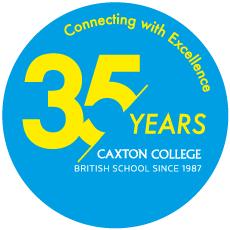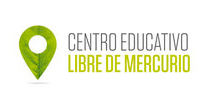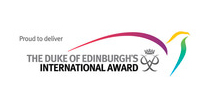British A-Levels
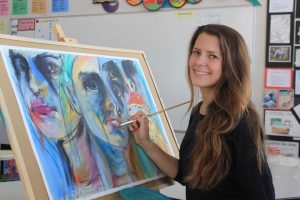 The study of Art provides a stimulating atmosphere that inspires, encourages and enriches the students’ understanding of the world of art and design.
The study of Art provides a stimulating atmosphere that inspires, encourages and enriches the students’ understanding of the world of art and design.Through specific imaginative and creative activities, we work on a wide variety of abilities. Our focus allows pupils to express themselves and to communicate ideas and feelings in visual media so that they can be successful in their studies and responsible citizens.
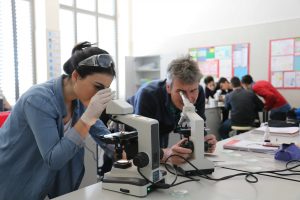
Biology is at the centre of scientific development in the 21st century. The human genome project has opened many doors in the field of medicine and in the way we understand life.
Our aim at Caxton College is for our pupils to acquire a thorough understanding of biological concepts in order to become the next generation’s doctors and scientists.
 Our aim is to offer an academic challenge to students and broaden their perspective on the ever changing world of business. We will concentrate on social, local, national and international aspects of business, as well as the impact of economic activity on our lives.
Our aim is to offer an academic challenge to students and broaden their perspective on the ever changing world of business. We will concentrate on social, local, national and international aspects of business, as well as the impact of economic activity on our lives.The department strives to demonstrate that Business Studies is a dynamic and diverse subject. Our aim is to achieve excellence, and we hope that our students will do this also.
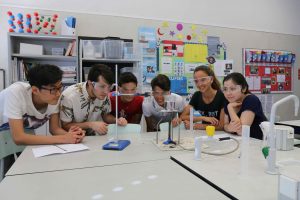 In the Chemistry Department, we want our students to be responsible individuals, as well as to be conscious of their impact on the environment. One of the many topics we study is environmental chemistry, which allows our students to understand the chemical theories behind many government and private sector initiatives.
In the Chemistry Department, we want our students to be responsible individuals, as well as to be conscious of their impact on the environment. One of the many topics we study is environmental chemistry, which allows our students to understand the chemical theories behind many government and private sector initiatives.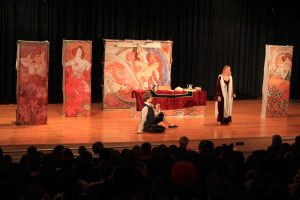 Studying English Literature develops and enhances students´ own abilities in English Language, through exposure to written English and class discussion on a range of topics. Across Europe, this level of study of English is regarded as an indication of a high level of ability in English as a language. Teachers use a range of strategies to make the study of English Literature fun, challenging and rewarding.
Studying English Literature develops and enhances students´ own abilities in English Language, through exposure to written English and class discussion on a range of topics. Across Europe, this level of study of English is regarded as an indication of a high level of ability in English as a language. Teachers use a range of strategies to make the study of English Literature fun, challenging and rewarding.
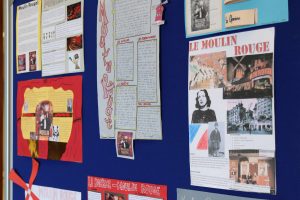 Our aim in the growing French Department is to promote students’ interest in the broader francophone culture, and to provide them with a high level of linguistic skills in this language that has countless applications.
Our aim in the growing French Department is to promote students’ interest in the broader francophone culture, and to provide them with a high level of linguistic skills in this language that has countless applications.
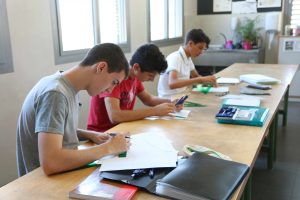 If any student enjoys studying Mathematics and achieved an outstanding grade in IGCSE Mathematics then they have the opportunity to study an AS or A Level in Further Mathematics in addition to the A Level in Mathematics. Further Mathematics introduces additional concepts such as Complex Numbers and Matrices that are not covered in the A Level Mathematics course. A Level Mathematics is a much sought-after qualification for entry to a wide variety of courses in higher education and is invaluable in many areas of employment.
If any student enjoys studying Mathematics and achieved an outstanding grade in IGCSE Mathematics then they have the opportunity to study an AS or A Level in Further Mathematics in addition to the A Level in Mathematics. Further Mathematics introduces additional concepts such as Complex Numbers and Matrices that are not covered in the A Level Mathematics course. A Level Mathematics is a much sought-after qualification for entry to a wide variety of courses in higher education and is invaluable in many areas of employment.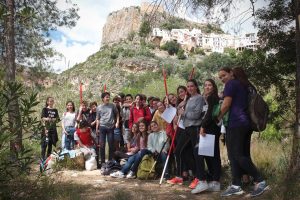 Without the science of Geography, the world would still be a mystery to us. Now that we have entered an era in which human beings can cause a profound effect on the world, the subject of Geography has never been so important.
Without the science of Geography, the world would still be a mystery to us. Now that we have entered an era in which human beings can cause a profound effect on the world, the subject of Geography has never been so important.In the department, our aim is to teach a syllabus that students will find interesting, useful and challenging in all years. We wish to reinforce the pupils’ skills in working individually and as a group; completing research and data analysis; and presenting their work. The students will have a positive atmosphere that will reinforce their self-confidence, with enthusiastic and dedicated teachers.
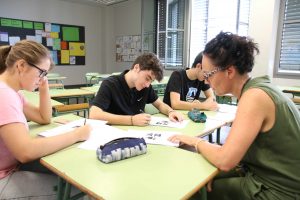 Study of the German language at Caxton College plays a fundamental role in the development of linguistic skills in general, and in understanding different cultures.
Study of the German language at Caxton College plays a fundamental role in the development of linguistic skills in general, and in understanding different cultures.The objectives are similar for all pupils who learn German: to develop skills that will allow the pupil to use the German language successfully in real communication situations, and to offer a vision and thorough understanding of the culture and civilisations of Germany, Austria and Switzerland, whilst promoting positive attitudes towards learning foreign languages and towards their native speakers.
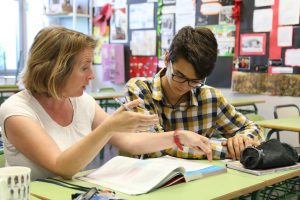 History permits our students to develop their own identity through knowledge of what was here before them on a personal, local, national and international level. This allows students to ask themselves questions and to develop different perspectives on the same fact.
History permits our students to develop their own identity through knowledge of what was here before them on a personal, local, national and international level. This allows students to ask themselves questions and to develop different perspectives on the same fact.
The study of History requires that students not accept information that has not first been subjected to a process of critical analysis.
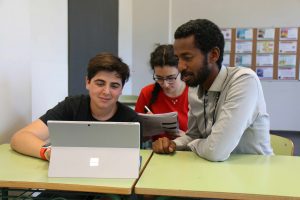 In the Maths Department, we strive for students to obtain the best possible results in their examinations, and the proof of this is that we have a record number of pupils choosing this subject for study in the Sixth Form. Our aim is to make the study of Maths entertaining and stimulating so that students understand the relevance of what they are learning, and how it can be applied to real situations and in their lives outside of school.
In the Maths Department, we strive for students to obtain the best possible results in their examinations, and the proof of this is that we have a record number of pupils choosing this subject for study in the Sixth Form. Our aim is to make the study of Maths entertaining and stimulating so that students understand the relevance of what they are learning, and how it can be applied to real situations and in their lives outside of school.Above all, we work to develop students’ self-confidence so that they do not become discouraged when they make mistakes, and so that they are always willing to take on new challenges.
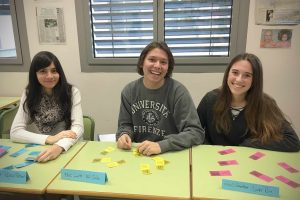 Academic Philosophy is the study of, and search for, the fundamental nature of reality and existence. Therefore, this subject is an opportunity for students to work out what they think about some of the big questions of life. It also involves reading the ideas of others, extracting their arguments and analysing them. Philosophy will teach students how to argue their point logically and forcefully. Students become acquainted with some of the most famous philosophical works, as well as many of the conceptual puzzles and tropes that permeate literature and art. Because of this, it is good preparation for studying many other subjects at University: Law, History, Literature, Business, or Art.
Academic Philosophy is the study of, and search for, the fundamental nature of reality and existence. Therefore, this subject is an opportunity for students to work out what they think about some of the big questions of life. It also involves reading the ideas of others, extracting their arguments and analysing them. Philosophy will teach students how to argue their point logically and forcefully. Students become acquainted with some of the most famous philosophical works, as well as many of the conceptual puzzles and tropes that permeate literature and art. Because of this, it is good preparation for studying many other subjects at University: Law, History, Literature, Business, or Art. In A Level PE, students will complete both practical and theory work. In the practical section, the students’ skill and technical ability will be evaluated by an external examiner.
In A Level PE, students will complete both practical and theory work. In the practical section, the students’ skill and technical ability will be evaluated by an external examiner.In the theory section, students will develop a greater understanding of the anatomy and physiology of the body, energy systems, diet and nutrition and how they contribute to providing energy. In addition, they will learn about the sociology and psychology of sport, technical developments in sports, short term preparation, long-term preparation including warming up, cooling down, training methods and fitness testing.
Physical Education is a subject that is useful in the fields of sports medicine, physiotherapy, coaching and even sports journalism.
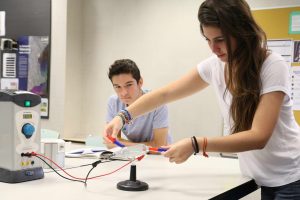 Physics has no limits. Everything in life, on this planet, on other planets, and as far as the universe reaches and farther is related to Physics.
Physics has no limits. Everything in life, on this planet, on other planets, and as far as the universe reaches and farther is related to Physics.The principal aim of the Physics Department at Caxton College is to inspire the next generation of physicists to push beyond the current limits of development and understanding, and to involve them in the search for solutions to the problems that we face in the 21st century.
Physics students develop practical skills such as the ability to plan and analyse scientific research. The department considers Physics to be more than just a subject at school, and our aim is for pupils to understand the importance of research and the impact that it has on our everyday lives.
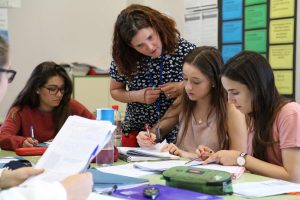 The Psychology Department’s aim in teaching A Level Psychology is to provide an academic challenge to students with key situations used to increase pupils’ knowledge of psychological theories and their applications in modern society.
The Psychology Department’s aim in teaching A Level Psychology is to provide an academic challenge to students with key situations used to increase pupils’ knowledge of psychological theories and their applications in modern society.All of this helps the student to understand society and our everyday surroundings. Psychology is a dynamic subject and this department strives to reflect this in all lessons.
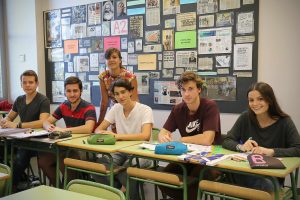 This course aims to give a critical understanding of contemporary social issues and the way in which globalised society is structured. Students have the opportunity of studying a number of different social theories, and explore ways in which they can be applied to both modern industrial and developing societies. The course encourages students to think about their own experiences and reflect upon them. Sociology is the study of the way in which society shapes people’s behaviour, beliefs and identity.
This course aims to give a critical understanding of contemporary social issues and the way in which globalised society is structured. Students have the opportunity of studying a number of different social theories, and explore ways in which they can be applied to both modern industrial and developing societies. The course encourages students to think about their own experiences and reflect upon them. Sociology is the study of the way in which society shapes people’s behaviour, beliefs and identity.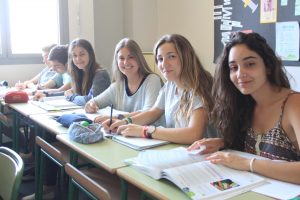 The Spanish and ELE (Spanish as a Foreign Language) Departments prepare students to sit the A Level Spanish examination in order for them to be able to understand a wide variety of complex texts; to write clear and well-structured essays with well-crafted arguments; to express themselves fluently, naturally and appropriately; and to understand the characteristics of the language in different cultural contexts. All of this will help them to become competent both in oral and written communication.
The Spanish and ELE (Spanish as a Foreign Language) Departments prepare students to sit the A Level Spanish examination in order for them to be able to understand a wide variety of complex texts; to write clear and well-structured essays with well-crafted arguments; to express themselves fluently, naturally and appropriately; and to understand the characteristics of the language in different cultural contexts. All of this will help them to become competent both in oral and written communication. The Extended Project Qualification (EPQ) allows students to extend their abilities beyond the A-level syllabus and prepare for university or their future career. It allows students to extend and develop their skills in independent research and project management, whilst exploring their passion for a topic. It is worth half an A-level so can also be used to earn extra UCAS points.
The Extended Project Qualification (EPQ) allows students to extend their abilities beyond the A-level syllabus and prepare for university or their future career. It allows students to extend and develop their skills in independent research and project management, whilst exploring their passion for a topic. It is worth half an A-level so can also be used to earn extra UCAS points.The EPQ requires students to carry out research on a topic that they have chosen and is not covered by their other qualifications. They then use this research to produce a written report of about 5000 words and, in the case of practical projects, an artefact or a production. A student can take inspiration from something studied in class or something completely unrelated to their studies.
The EPQ allows students to embark on largely self-directed projects. By taking responsibility for the choice and design of an individual project (or an individual role in a group project) students:
• become more critical, reflective and independent learners.
• develop and apply decision-making and problem-solving skills.
• increase their planning, research, analysis, synthesis, evaluation and presentation skills.
• learn to apply new technologies confidently.
• demonstrate creativity, initiative and enterprise.
In addition to the report, the EPQ requires students to record their progress in the form of a log book and also to give a presentation to a non-specialist audience. Students start the EPQ in the first term of Year 12 and will complete the main part of the project by the beginning of Year 13. Final presentations will take place during the first term of Year 13.



